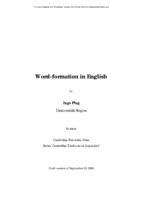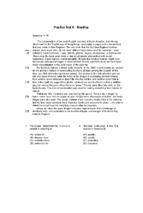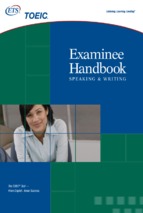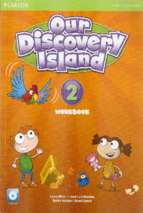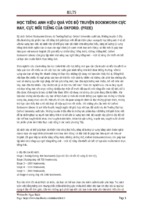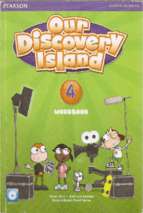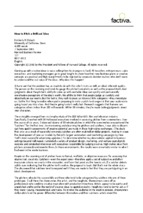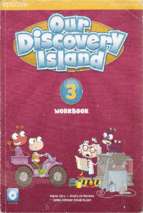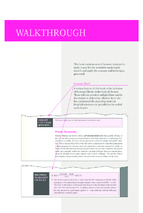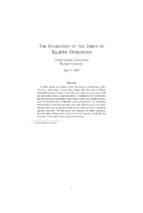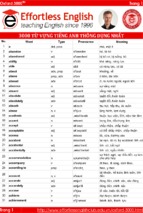A-PDF CHM TO PDF DEMO: Purchase from www.A-PDF.com to remove the watermark
< Prev
I l@ve RuBoard
Next >
Page i
The Ins and Outs of Prepositions
by Jean Yates
1 / 141
< Prev
I l@ve RuBoard
Next >
Page iii
TABLE OF CONTENTS
Introduction
V
Part One: The Prepositions
How to Use Part One
3
1 · About
5
2 · Above
8
3 · Across
9
4 · After
10
5 · Against
12
6 · Ahead Of*
14
7 · Along
15
8 · Among
16
9 · Around
17
10 · As
19
11 · At
20
12 · Back to*/Back From*
25
13 · Before
27
14 · Behind
28
15 · Below
29
16 · Beneath
30
17 · Beside
31
18 · Besides
32
19 · Between
33
20 · Beyond
34
21 · But
35
22 · By
36
23 · Close to*
39
24 · Despite/In Spite Of*
40
25 · Down
41
26 · During
43
2 / 141
27 · Except
44
28 · Far From*
45
29 · For
46
30 · From
53
31 · In
56
32 · In Back Of*
68
33 · In Front Of*
69
34 · Inside
70
35 · Instead Of*
71
36 · Into
72
37 · Like
74
38 · Near
75
39 · Next To*
76
40 · Of
77
41 · Off
83
42 · On
87
43 · Onto
97
44 · On Top Of*
98
45 · Opposite
99
46 · Out
100
47 · Outside
105
48 · Over
106
49 · Past
110
50 · Through
111
51 · Throughout
114
52 · To
115
53 · Toward
121
54 · Towards
122
55 · Under
123
56 · Underneath
125
57 · Until
126
58 · Up
127
3 / 141
59 · With
133
60 · Within
139
61 · Without
140
* Two- or Three-Word Combinations That Function As Prepositions
4 / 141
< Prev
I l@ve RuBoard
Next >
Page v
INTRODUCTION
Prepositions pose more problems for the non-native speaker or learner of English than any other part of speech. Why? Prepositions are just little
words that never change in form; they are pronounced softly, in unstressed syllables; they aren't even given capital letters in book titles; native
speakers choose the correct ones without thinking. How can they be confusing?
The word "preposition" has a straightforward definition: a word placed before a noun or pronoun to define its relationship with another word in
the sentence. For the learner of English, however, prepositions are anything but straightforward.
—Prepositions are difficult, if not impossible, to define without using other prepositions.
Example:
In the sentence, "The book is on the table," what does on mean?
On means "above and supported by."
—In no other language are the prepositions (if they exist at all) the exact equivalents of English prepositions.
Example:
Spanish
English
Vive en Washington.
He lives in Washington.
Vive en la Avenida New Jersey.
He lives on New Jersey Avenue.
El está en el aeropuerto.
He is at the airport.
Estoy pensando en ti.
I am thinking about you, or
I am thinking of you.
—Many preposition words can also be adverbs or conjunctions.
Examples:
the preposition down
She walked down the hill.
the adverb down
He put the book down.
the preposition after
She took a nap after lunch.
the conjunction after
She went outside after she put the book down.
—Many prepositions can indicate more than one meaning or relationship.
Examples with after:
later than
We rested after lunch.
in pursuit of
The cat is after the mouse.
because of
He was angry after the way she acted.
in the style of
This is a painting after Picasso.
continuously
She worked night after night.
5 / 141
< Prev
I l@ve RuBoard
Next >
Page 1
PART ONE—
THE PREPOSITIONS
6 / 141
< Prev
I l@ve RuBoard
Next >
Page 3
How to Use Part One
Each definition of a preposition is followed by one or more patterns, which indicate the word order appropriate for the definition.
The verbs in each pattern can be changed to other tenses.
Example:
Pattern: verb + toward + noun
The money goes toward helping the family.
This could also be:
The money went toward helping the family.
The money will go toward helping the family.
The money is going to go toward helping the family.
When a word cannot be substituted, that word is included in the pattern.
Example:
Pattern: be + after + noun
The reception is after the wedding.
be is the only possible verb for this pattern.
When a word is optional, it is in parentheses.
Example:
Pattern: be + outside (of) + noun
The dog is outside the house.
The dog is outside of the house.
When the word noun is in the pattern, use the normal patterns for noun usage, as outlined in Part Three.
Example:
Pattern: verb + against + noun
Dr. Jones is against the idea.
This could also be:
Dr. Jones is against my idea.
Dr. Jones is against this idea.
Dr. Jones is against our ideas.
Dr. Jones is against some of their ideas.
When the noun determiner cannot be substituted, it is included in the pattern.
Example:
Pattern: verb + against + the + noun
We sailed against the wind for an hour.
(the cannot be replaced by a, this, my, or any other word)
7 / 141
< Prev
I l@ve RuBoard
Next >
Page 5
1—
About
1 About identifies a topic.
Pattern 1: noun + be + about + noun
This book is about prepositions.
Nouns commonly used before about:
argument, article, book, conversation, disagreement, discussion, joke, lecture, movie, news, play, program, report, speech, story
Pattern 2: noun + about + noun
She gave me advice about my loan.
Nouns commonly used before about:
assurance, complaint, comment, gossip, lie, question, statement, truth
Pattern 3: verb + about + noun
He often talks about his job.
Verbs commonly used before about:
agree, argue, brag, care, complain, cry, do, dream, forget, groan, hear, joke, know, laugh, lie, moan, pray, read, say, scream, sing,
talk, think, wonder, worry, yell
Expressions:
to see about—
1. to delay a decision until more information is known
We want to buy a house, but we will see about that later.
2. to get information about
I called that office to see about getting a job there.
to find out about—to get information about
She called the school to find out about her daughter's behavior.
Pattern 4: verb + noun + about
She knows something about airplanes.
Typical verbs used with this pattern:
ask, find out, know, learn, say
Typical nouns used before about:
a little, a lot, quite a bit, nothing, something, very little
Pattern 5: verb + indirect object + about + noun
They asked me about my trip.
Verbs commonly used with this pattern:
advise, ask, bother, contact, harass, question, remind, teach, tell, write
Pattern 6: adjective + about + noun
They were very kind about our late arrival.
Adjectives commonly used before about:
charming, kind, nasty, nice, mean, rude, sweet, understanding, unkind
2 About can identify the cause of an emotion or condition.
Pattern: adjective + about + noun
We are excited about our vacation.
8 / 141
< Prev
I l@ve RuBoard
Next >
Page 8
2—
Above
1 Above can mean in or at a higher place.
Pattern 1: be + above + noun
A dark cloud was above the house.
Pattern 2: verb + noun + above + noun
Let's hang the picture above the sofa.
Verbs commonly used before above:
arrange, carry, hang, hold, keep, place, put, set
2 Above can mean at a higher level, value, or rank.
Her blood pressure is above normal.
The children in her class are all above average.
In the navy, a captain is above a commander.
3 Above (adverb) can indicate something written earlier in a book, article, or other document.
Please see the instructions above.
4 Above (adjective) describes something written earlier.
Please follow the above instructions.
5 Above indicates that a person is too good to commit the stated negative action.
Pattern 1: be + above + noun
The policeman is above cruelty.
Nouns often used after above:
cruelty, dishonesty, meanness, perjury, theft, murder, treason
Pattern 2: be + above + verb in gerund form
He may be poor, but he is above stealing.
Gerunds often used with this meaning:
breaking the law, cheating, gossiping, lying, robbing, snooping, stealing
6 Expressions
up above (adverb)—in heaven
Our dear grandmother is now in peace up above.
above and beyond the call of duty—action that is more or greater than what is expected of a person
My teacher's help after school was above and beyond the call of duty.
above board—completely honest and open
Our negotiations with the company were above board.
above the law—exempt from restrictions of the law
People in power sometimes believe they are above the law.
9 / 141
< Prev
I l@ve RuBoard
Next >
Page 9
3—
Across
1 Across indicates the direction of movement from one side of an area to the other.
Pattern: motion verb + across + noun
The girl ran across the yard.
Verbs often used before across:
crawl, drive, go, limp, move, ride, run, swim, walk
2 Across can mean on the other side of a place.
Pattern: verb + across + noun
My friend lives across the street.
3 Across from means opposite or facing.
Pattern 1: verb + across from + noun
My assistant's office is across from mine.
My secretary sits across from me.
Pattern 2: verb + across + noun + from + noun
My assistant's office is across the hall from mine.
4 Across and all across mean in every area of.
People across the world are using the Internet.
There is a heat wave all across the country.
Expression:
across the board—including everyone or everything
Everyone got a raise in salary: there was a wage increase of three percent across the board.
5 Phrasal verbs
come across (nonseparable)—find something unexpectedly
I came across this old picture of you when I was looking for some documents.
come across (intransitive)—be received by an audience
The banquet speaker was not sure how well he came across.
run across (nonseparable)—to find something unexpectedly
I ran across a letter you wrote to me when we were children.
get (something) across to (separable)—make something understood
The young girl tried to get it across to her boyfriend that she was not ready to get married.
10 / 141
< Prev
I l@ve RuBoard
Next >
Page 10
4—
After
1 After means later than or following.
Pattern 1: be + after + noun
The reception is after the wedding ceremony.
Pattern 2: after + gerund form of verb + noun
After finishing your homework, you can watch television.
Pattern 3: after (conjunction) + subject noun + verb
After you finish your homework, you can watch television.
Pattern 4: verb + after (conjunction) + subject noun + verb
The boss left after I came in.
2 After can mean lower in value or rank.
That school's athletes placed after ours in the playoffs.
3 After can mean in pursuit of.
Pattern: verb + after + noun
The cat ran after the mouse.
Verbs often used before after:
be, come, go, run
4 After can mean because of.
Pattern: adjective . . . + after + noun
He was mad at her after her behavior at the party.
Typical nouns used after after:
attitude, behavior, failure, kindness, manners, outburst, reaction, success
5 After can mean in spite of.
Pattern: after + verb in gerund form
They never got married, after dating for years.
After reading this article three times, I still don't understand it.
6 After can mean in the style of.
Pattern: noun + after + noun
The school play was a drama after Shakespeare.
7 After can indicate continuously.
Pattern: time period + after + same time period
The man waited night after night for his telephone to ring.
Life got harder year after year.
His mother told him time after time to clean up his room.
Nouns often used with this meaning:
day, hour, month, night, time, week, year
11 / 141
< Prev
I l@ve RuBoard
Next >
Page 12
5—
Against
1 Against means touching something or somebody for support.
Pattern 1: verb + against + noun
The man was leaning against his car.
Typical verbs used before against:
hang, lean, lie, rest, sleep
Pattern 2: verb + noun + against + noun
They held the mirror against the wall.
Typical verbs used before against:
butt, hold, keep, lay, lean, place, pull, put, rest, set
2 Against means touching forcibly.
Pattern: noun + verb + against + noun
The rain beat against the window.
Verbs often used before against:
bang, beat, crash, crush, heave, hit, knock, push, splash, throw, thrust
3 Against means in opposition to.
Pattern: noun + verb + against + noun
The mayor was against the idea of a new day-care center.
Stealing is against the law.
Our senator voted against that bill.
Typical verbs used before against:
act, argue, campaign, debate, fight, go, move, play, vote, work
Nouns often used after against:
action, bill, concept, enemy, force, idea, law, nomination, orders, plan, precepts, principles, proposal, regulations, religion, rules,
suggestion, teachings, team, wishes
4 Against can mean toward a force in the opposite direction.
Pattern: verb + against + the + noun
Sailing was rough yesterday; we sailed against the wind all day.
Typical verbs used before against:
drive, fight, go, move, run, sail, struggle, swim, walk
Nouns often used after against:
current, flow, force, tide, wind
Expression:
against traffic—
I drive against traffic because I live in the city and I work in the suburbs.
5 Against can mean to the disadvantage of.
Pattern: noun + be + against + noun
You may not get that job because your age is against you.
12 / 141
< Prev
I l@ve RuBoard
Next >
Page 14
6—
Ahead Of
1 Ahead of means closer to a destination than or in front of.
My friend arrived first, and was ahead of me in line.
2 Ahead of means before.
You are in a hurry; please go ahead of me.
3 Ahead of can mean more advanced than.
Because he was absent for two weeks, the other students in his class are ahead of him.
4 Phrasal verbs
get ahead (intransitive)—succeed
She has struggled all her life to get ahead.
get ahead of (nonseparable)—advance faster or further than someone else
They are rivals, always competing to get ahead of each other.
go ahead (intransitive)—Do it; begin now
I asked for permission, and they told me to go ahead.
13 / 141
< Prev
I l@ve RuBoard
Next >
Page 15
7—
Along
1 Along means following the boundary of something.
Pattern: verb + along + noun
We walked along the water's edge at the beach last night.
Typical verbs before along:
jog, stroll, run, walk
2 Along with means together.
Pattern: verb + along with + noun
He used to sing along with me.
Typical verbs used before along with:
hum, play, run, sing, walk, work
3 Expressions
all along (adverb)—the whole past time
They have been enemies all along.
4 Phrasal verbs
get along (intransitive)—live together in harmony
She and her old roommate didn't get along.
get along with (nonseparable)—to live in harmony with someone
I hope she gets along with her new roommate.
14 / 141
< Prev
I l@ve RuBoard
Next >
Page 16
8—
Among
1 Among can mean surrounded by.
Pattern: verb + among + plural (three or more) noun
They camped in the woods among the trees.
2 Among can mean with each other.
Pattern: verb + among + plural (three or more) noun
The children quarreled among themselves.
Typical verbs before among:
argue, celebrate, debate, discuss something, fight, play, share something, talk
3 Among can mean to the individuals in a group.
Pattern: verb + among + plural (three or more) noun
They distributed the flyers among the students.
Typical verbs before among:
distribute, hand out, pass out
4 Among can mean included in a group.
Your friends are among the survivors.
5 Among can indicate many of a group.
Latin dancing is popular among the college students.
15 / 141
< Prev
I l@ve RuBoard
Next >
Page 17
9—
Around
1 Around means following a boundary, in a circular direction.
Pattern: motion verb + around + noun
We walked around the block.
Verbs commonly used before around:
drive, fly, race, ride, run, skip, travel, walk
Nouns commonly used after around:
block, building, house, room, track, world
2 Around (adverb) indicates movement in a circular direction in place.
Pattern: verb + around (on)
The earth spins around on its axis as it travels around the sun.
Typical verbs used before around:
spin, turn, whirl
Expressions:
1. turn around (adverb)—face the opposite direction
You are going east; to go west, you have to turn around.
2. turn something around (adverb)—reverse the position of something
Turn your chair around and talk to me.
3 Around means enclosing.
Pattern: verb + noun + around + noun
The teacher drew a circle around each mistake.
The rancher put a rope around the cow's neck.
Verbs commonly used with this pattern:
draw, fasten, put, tie, wrap
4 (All) around means in all areas of.
There is crime all around this city.
5 (All) around can mean on all sides of.
People were screaming all around me.
6 Around means on another side of.
The bank is around the corner.
Their farm is just around the bend.
Expressions:
1. around back —at the back of a building
Go around back to pick up your merchandise.
2. go around the bend—be crazy
I am so busy, I think I am going around the bend.
16 / 141
< Prev
I l@ve RuBoard
Next >
Page 19
10—
As
1 As means in the role of.
Pattern 1: verb + as + noun
She is a trained teacher, but she works as a secretary in our office.
Typical verbs used before as:
act, serve, substitute, volunteer, work
Pattern 2: verb + noun + as + noun
We have selected you as the captain of the team.
Typical verbs:
choose, elect, nominate, pick, select, use
2 Expression
as for me—regarding me
They all went to the movies; as for me, I stayed home.
17 / 141
< Prev
I l@ve RuBoard
Next >
Page 20
11—
At
1 At can indicate location
Pattern 1: at + the + place within a city or town
The women are at the supermarket.
Nouns commonly used with this pattern:
apartment, bus stop, factory, hospital, hotel, house, mall, office, park, parking lot, restaurant, station, store, theater, university
Pattern 2: at + an address
She lives at 3757 North 52nd Street, apartment 10.
You can contact him by e-mail, @xyz.com
(The symbol @ is pronounced ''at.")
Pattern 3: at + the + place within another place
He was waiting in the room at the door.
He likes to sit in her apartment at the window facing the park.
Nouns commonly used with this pattern:
counter, desk, table, window
2 At indicates a place of attendance.
Pattern 1: be + at + Æ place or meal of regular attendance
The children are at school.
We aren't allowed to watch television when we are at dinner.
Nouns used with this pattern:
church, class, home, practice, school, work
breakfast, lunch, dinner
Pattern 2: be + at + noun of event
They are at the movies.
She is at a meeting.
Nouns commonly used with this pattern:
breakfast, brunch, celebration, concert, conference, dance, debate, dinner, forum, function, funeral, game, lecture, luncheon,
meeting, movies, parade, party, play, program, reading, reunion, show, wedding
3 At can indicate in the direction of; toward.
Pattern 1: verb + at + noun
The teacher smiled at the new girl.
Verbs commonly used with this pattern:
aim, frown, glare, grab, grin, growl, hit, howl, laugh, leer, look, rush, shoot, shout, slap, smile, snatch, stare, swear, swing, wink, yell
Pattern 2: verb + noun + at + noun
The small boy threw a rock at the window.
Typical verbs:
swing, throw, toss
18 / 141
< Prev
I l@ve RuBoard
Next >
Page 25
12—
Back to/Back From
1 Back to indicates return.
Pattern 1: verb + back to + noun of place or time
Please go back to the beginning of your story.
The children went back to the museum to see the new exhibit.
Verbs often used before back to:
crawl, drive, fly, go, hark, jump, look, move, race, run, think, walk
Pattern 2: verb + noun + back to + noun
We took the train back to the city.
Typical verbs:
bring, carry, drive, push, pull, take
2 Back from indicates return to a starting place from a different place.
Pattern: verb + back from + noun of place
I'll be back (home) from the store in about ten minutes.
We can't leave until your mother gets back from her trip.
Typical verbs before back from:
be, come, drive, fly, get, move, run, walk
3 Back indicates a return of something.
Pattern 1: verb + noun + back (+ to + noun)
Please give this plate back to your mother.
I took the dress back to the store because it didn't fit.
Typical verbs:
bring, give, pay, send, take
Pattern 2: verb + noun + back (+ from + noun)
Please get my suit back from the cleaners.
Pattern 3: verb + noun + back (adverb)
I called you back when I got home.
Typical verbs:
call, bring, pay, put, take
4 Phrasal verbs
get back (intransitive)—move out of the way
We wanted to see the action, but they made us get back.
get back to someone (nonseparable)—call someone with new information
As soon as I know the figures, I will get back to you.
get back at someone (nonseparable)—do harm in return for a wrong
After he was fired, he tried to get back at his boss.
19 / 141
< Prev
I l@ve RuBoard
Next >
Page 27
13—
Before
1 Before means earlier than.
We must leave before four o'clock.
2 Before can mean in a more important position than.
She is so ambitious that she puts her job before her family.
3 Before can mean facing.
The handsome singer had many adoring fans before him.
4 Before can mean in the future.
The bride smiled as she thought of the happiness before her.
5 Before can mean in the presence of.
I was told to appear before the judge.
20 / 141
- Xem thêm -


